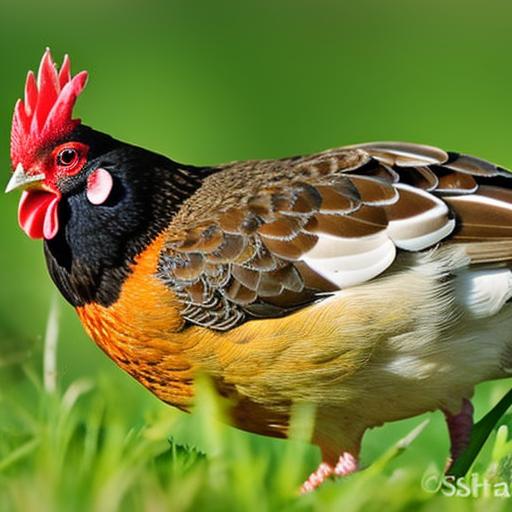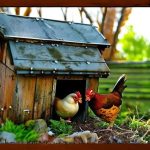Keeping chickens has become increasingly popular in recent years, and for good reason. Not only do chickens provide a sustainable source of fresh eggs, but they also offer a range of other benefits. For example, chickens can help control pests in your garden by eating insects and other small creatures. Additionally, their waste can be used as fertilizer for your plants, creating a natural and nutrient-rich soil amendment. However, in order to keep chickens healthy and happy, it is important to provide them with access to grass.
Key Takeaways
- Keeping chickens has many benefits, including fresh eggs and natural pest control.
- Grass is important for chickens as it provides them with exercise, nutrition, and a place to forage.
- Without grass, chickens may experience health problems and behavioral issues.
- Alternative flooring options for chicken coops include sand, straw, and wood shavings.
- Providing adequate space for chickens is crucial for their health and well-being.
The Importance of Grass for Chickens
Grass is an essential component of a chicken’s diet and overall well-being. Chickens are natural foragers, and grass provides them with a source of food that is rich in nutrients. It also allows them to engage in natural behaviors such as scratching and pecking, which helps keep their beaks and claws healthy. In addition to providing food, grass also offers chickens the opportunity for exercise and mental stimulation. Chickens love to explore and roam around, and having access to grass allows them to do so.
The Challenges of Keeping Chickens Without Grass
While keeping chickens without access to grass is possible, it does come with its challenges. One of the main difficulties is the potential for health problems. Grass provides chickens with essential nutrients such as vitamins A and D, which are important for their overall health and immune system function. Without access to grass, chickens may become deficient in these nutrients, leading to a range of health issues.
Another challenge is boredom. Chickens are intelligent animals that require mental stimulation to thrive. Without access to grass, they may become bored and exhibit behavioral issues such as feather picking or aggression towards other chickens. Additionally, without the opportunity to engage in natural behaviors such as scratching and pecking at the ground, chickens may become stressed or frustrated.
Alternative Flooring Options for Your Chicken Coop
If you don’t have access to grass for your chickens, there are alternative flooring options that can mimic some of the benefits of grass. One option is sand, which can provide a soft and comfortable surface for chickens to walk on. Sand also allows chickens to engage in natural behaviors such as dust bathing, which helps keep them clean and healthy.
Another option is straw or wood shavings. These materials can provide a cushioned surface for chickens to walk on and can also help absorb moisture and odor in the coop. However, it is important to regularly clean and replace these materials to prevent the buildup of waste and bacteria.
Providing Adequate Space for Your Chickens
Regardless of whether or not you have grass, it is important to provide your chickens with enough space to move around and forage. The general rule of thumb is to provide at least 4 square feet of space per chicken in the coop, and at least 10 square feet per chicken in the outdoor run. This will allow your chickens to spread their wings, explore their environment, and engage in natural behaviors.
If you don’t have access to grass, consider providing other forms of enrichment such as perches, toys, or hanging treats. These can help keep your chickens entertained and mentally stimulated.
The Role of Diet in the Absence of Grass

In the absence of grass, it is important to provide a balanced diet for your chickens that includes all the necessary nutrients they would normally get from grass. This includes protein, calcium, vitamins, and minerals. Commercial chicken feed is formulated to meet these nutritional requirements and should be the main component of your chickens’ diet.
However, it is also beneficial to supplement their diet with other sources of greens. Leafy greens such as kale, spinach, or dandelion greens can provide additional vitamins and minerals that are important for your chickens’ health. You can offer these greens as treats or mix them into their feed.
The Importance of Maintaining a Clean Coop
Whether or not you have grass, it is important to keep your chicken coop clean and free of waste. This will help prevent the buildup of bacteria and parasites that can cause health problems for your chickens. Regularly clean out the coop and replace bedding materials to ensure a clean and healthy environment for your chickens.
Creating a Dust Bath for Your Chickens
Dust bathing is an important behavior for chickens, as it helps keep their feathers clean and free of parasites. If you don’t have access to grass, you can create a dust bath area for your chickens using sand or dirt. Simply provide a shallow container filled with sand or dirt, and your chickens will instinctively know what to do. Make sure to place the dust bath in a shaded area to prevent it from becoming too hot.
Supplementing Your Chickens’ Diet with Greens
In the absence of grass, it is important to supplement your chickens’ diet with other sources of greens. Leafy greens such as kale, spinach, or dandelion greens can provide additional vitamins and minerals that are important for your chickens’ health. You can offer these greens as treats or mix them into their feed.
Is It Possible to Keep Chickens Without Grass?
While it is possible to keep chickens without access to grass, it does come with its challenges. Grass provides chickens with a natural source of food, exercise, and mental stimulation that is difficult to replicate with alternative flooring options. However, by providing adequate space, a balanced diet, and other forms of enrichment, you can help keep your chickens healthy and happy even without grass. Remember to regularly clean the coop and provide opportunities for dust bathing and access to greens to ensure the well-being of your flock.
If you’re considering keeping chickens but don’t have a grassy area for them to roam, you might be wondering if it’s still possible. Well, according to an article on Poultry Wizard, it is indeed possible to keep chickens without grass. The article provides valuable insights and tips on how to create a suitable environment for your feathered friends even without a traditional grassy space. From alternative flooring options to providing adequate exercise and nutrition, this article offers practical advice for anyone looking to keep chickens in a non-grassy setting. To learn more about this topic, check out the article here.
FAQs
What is the article about?
The article is about whether it is possible to keep chickens without grass.
Why do chickens need grass?
Chickens need grass to scratch and peck at, which helps them to maintain their health and well-being. Grass also provides a natural source of food and helps to keep chickens entertained.
Can chickens be kept without grass?
Yes, chickens can be kept without grass, but it is not ideal. Chickens that are kept without grass will need to be provided with alternative sources of food and entertainment.
What are some alternatives to grass for chickens?
Some alternatives to grass for chickens include straw, hay, and wood shavings. These materials can be used to create a comfortable and safe environment for chickens to live in.
What are the disadvantages of keeping chickens without grass?
The disadvantages of keeping chickens without grass include the need to provide alternative sources of food and entertainment, as well as the potential for health problems such as obesity and boredom.
What are the advantages of keeping chickens with grass?
The advantages of keeping chickens with grass include the natural source of food and entertainment that it provides, as well as the health benefits that come with a more natural environment. Chickens that have access to grass are also less likely to develop health problems such as obesity and boredom.
Meet Walter, the feathered-friend fanatic of Florida! Nestled in the sunshine state, Walter struts through life with his feathered companions, clucking his way to happiness. With a coop that’s fancier than a five-star hotel, he’s the Don Juan of the chicken world. When he’s not teaching his hens to do the cha-cha, you’ll find him in a heated debate with his prized rooster, Sir Clucks-a-Lot. Walter’s poultry passion is no yolk; he’s the sunny-side-up guy you never knew you needed in your flock of friends!







